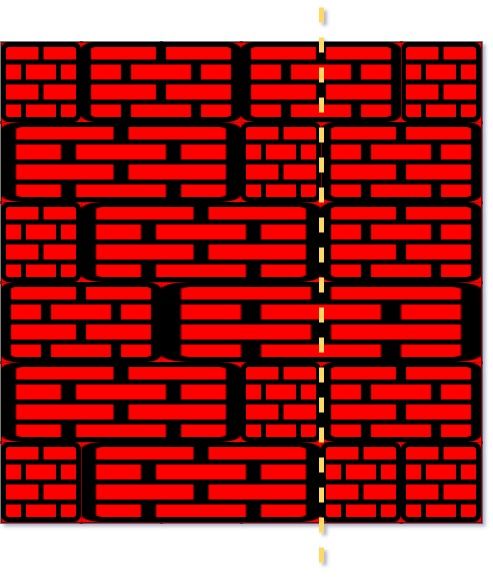Welcome to Subscribe On Youtube
554. Brick Wall
Description
There is a rectangular brick wall in front of you with n rows of bricks. The ith row has some number of bricks each of the same height (i.e., one unit) but they can be of different widths. The total width of each row is the same.
Draw a vertical line from the top to the bottom and cross the least bricks. If your line goes through the edge of a brick, then the brick is not considered as crossed. You cannot draw a line just along one of the two vertical edges of the wall, in which case the line will obviously cross no bricks.
Given the 2D array wall that contains the information about the wall, return the minimum number of crossed bricks after drawing such a vertical line.
Example 1:

Input: wall = [[1,2,2,1],[3,1,2],[1,3,2],[2,4],[3,1,2],[1,3,1,1]] Output: 2
Example 2:
Input: wall = [[1],[1],[1]] Output: 3
Constraints:
n == wall.length1 <= n <= 1041 <= wall[i].length <= 1041 <= sum(wall[i].length) <= 2 * 104sum(wall[i])is the same for each rowi.1 <= wall[i][j] <= 231 - 1
Solutions
The question can be understood as, let the vertical line pass through the edge of the brick as much as possible, use the hash table to process the frequency of the brick edge in different positions (not including the two vertical edges), and the final answer is the total number of rows minus the maximum Frequency.
-
class Solution { public int leastBricks(List<List<Integer>> wall) { Map<Integer, Integer> cnt = new HashMap<>(); for (List<Integer> row : wall) { int width = 0; for (int i = 0, n = row.size() - 1; i < n; i++) { width += row.get(i); cnt.merge(width, 1, Integer::sum); } } int max = cnt.values().stream().max(Comparator.naturalOrder()).orElse(0); return wall.size() - max; } } -
class Solution: def leastBricks(self, wall: List[List[int]]) -> int: cnt = defaultdict(int) for row in wall: width = 0 for brick in row[:-1]: width += brick cnt[width] += 1 if not cnt: return len(wall) return len(wall) - cnt[max(cnt, key=cnt.get)] -
func leastBricks(wall [][]int) int { cnt := make(map[int]int) for _, row := range wall { width := 0 for _, brick := range row[:len(row)-1] { width += brick cnt[width]++ } } max := 0 for _, v := range cnt { if v > max { max = v } } return len(wall) - max } -
/** * @param {number[][]} wall * @return {number} */ var leastBricks = function (wall) { const cnt = new Map(); for (const row of wall) { let width = 0; for (let i = 0, n = row.length - 1; i < n; ++i) { width += row[i]; cnt.set(width, (cnt.get(width) || 0) + 1); } } let max = 0; for (const v of cnt.values()) { max = Math.max(max, v); } return wall.length - max; }; -
class Solution { public: int leastBricks(vector<vector<int>>& wall) { unordered_map<int, int> cnt; for (const auto& row : wall) { int s = 0; for (int i = 0; i + 1 < row.size(); ++i) { s += row[i]; cnt[s]++; } } int mx = 0; for (const auto& [_, x] : cnt) { mx = max(mx, x); } return wall.size() - mx; } }; -
function leastBricks(wall: number[][]): number { const cnt: Map<number, number> = new Map(); for (const row of wall) { let s = 0; for (let i = 0; i + 1 < row.length; ++i) { s += row[i]; cnt.set(s, (cnt.get(s) || 0) + 1); } } const mx = Math.max(...cnt.values(), 0); return wall.length - mx; }